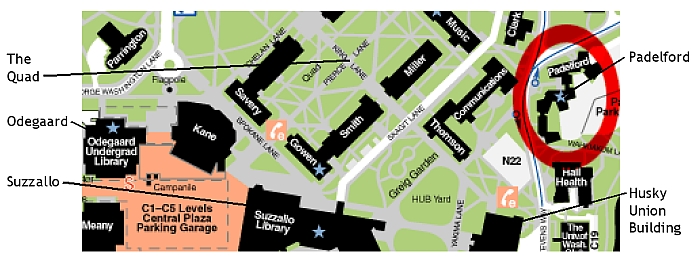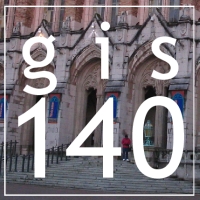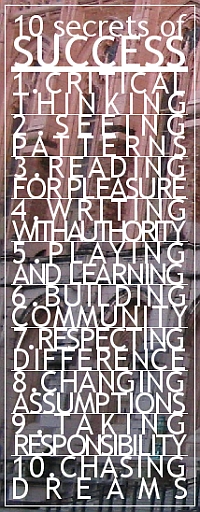|
© 2005-07 Edmond Chang. All original material. All rights reserved. Email the webmaster of this site. These pages are best viewed with Mozilla Firefox or Internet Explorer. Open your browser to the largest viewable area. These pages are hosted by the University of Washington Computing & Communications system. |
Download the PDF version of the course policies. Who is teaching the class?
Instructor: Edmond Chang
What are the course texts and materials?
• GIS 140 Course Packet (Chang) (required)
What is GIS 140?Ursula K. Le Guin once wrote, “First sentences are doors to worlds.” In a manner of speaking, GIS 140 is the first sentence, the first words of your university experience. This class is a first step, a first look, and often a first in-depth exploration of your transition to college, of academic reading, writing, research, of campus resources, and of critical and scholarly thinking. In this course, you will learn to become critically conscious of your specific relationship to and encounters with writing and reading — you will be metacognitive about your own academic strengths and difficulties. In other words, through thinking about and reflecting on the writing, reading, and analytical skills you bring to this class, you will learn to assess who you are as a writer and develop your skills to engage with and to perform more effectively in college writing courses like English 131, 121, or 111. This course is divided into three major sequences. The first of the three sequences focuses on the concept of literacy and the nature of learning. You will explore these subjects critically and theoretically by reading essays and narratives about the process of learning to read and write. You will also write your own literacy narrative in which you reflect on your own experiences with reading and writing. Furthermore, we will push the definition of literacy beyond just a knowledge of letters to include multiple literacies and multiple ways of knowing and showing. The second sequence examines the challenges and strategies of active learning and academic inquiry. We will explore the concept of difficulty in reading and learning, conventions of ‘academic discourse’, reasons why students resist facing challenges, and ways for working through difficult learning tasks. At the same time, we will further develop writing habits, reading lenses, and learning practices, including close reading and responding to difficult texts, analyzing texts, working in peer groups, conducting research, and using campus resources. Finally, the third sequence asks you to look back at the quarter and reconsider your literacy narrative in terms of the ways your writing, reading, and learning have changed. You will be asked to put together a portfolio of all of your work and to submit a culminating prospective essay in which you will track your progress as a writer, reader, and scholar. The prospective essay will serve both as a cover letter to your portfolio and as a survey of how you now view yourself as a writer, the challenges you will face in future classes, how you expect to meet these challenges, and how you will further develop your new set of skills, strategies, and theories. GIS 140 promises a fast-paced, compressed quarter of writing, reading, discussion, research, asking questions, more writing, revision, more reading, more discussion, critical thinking, analysis, fun, and even more writing and revision. We will engage texts small and large, everyday and theoretical. This particular incarnation of GIS 140 also promises a healthy inclusion of popular culture, cultural studies, politics, gender studies, new media, and experiential learning. By the end of the quarter, the hope of this course is that you realize that learning and knowledge and experience are more than just rubrics, rote, numbers, syllabuses, tests, grades, and graduation requirements—that learning and knowledge are fundamentally interconnected, intertextual, personal, political, cultural, and mutually enhancing. What are the course goals (Course Outcomes)?
1. To understand, develop, and sustain a metacognitive approach to writing.
• to make the transition from high school to college-level writing 2. To develop strategies for active learning through writing and close reading.
• to engage in academic inquiry, conversation, and research 3. To locate, explore, and use different academic and collegial resources.
• to develop peer review strategies to read your and your peers' writing productively
What do I need to do to get the most out of the class?Improving your writing requires working simultaneously on different skills in different ways. This course combines several different activities and exercises to teach, improve, and illuminate the reading, thinking, and writing process. This course will include the following: Participation: A classroom is a community. Both classroom and community provide support, safety, shared resources, conversation, and interaction. All students are expected to come to class prepared with readings and work done and to engage in the discussion and activities. Participation is important and you are encouraged to ask questions, create conversation, and respect one another. Negative class participation can hurt your grade. See the later section on grading. Papers/Portfolio: Your main work in the course consists three sequences of papers. Each of the sequences is made up of three to five short assignments and one longer, major paper. Each assignment in a sequence is designed to build one upon the other and must be done in the order specified and turned in on time. In order to pass this class, you must have a complete portfolio. See the later section on grading. Process Journal: Part of the writing that you will be doing will be in the form of a process journal. You will use your process journal for freewrites, in-class writing, strength and difficulty inventories, reflection on writing and reading tasks, self-assessment, note taking, brainstorming, group work, and journaling your thoughts, ideas, and responses to the class. Process journal assignments will be given daily in-class or for homework. Your process journal is part of your overall class participation grade. Peer Review/Workshopping: Working in groups is one vital skill that this course hopes to foster. Collaborative learning and collaborative teaching add interest and investment in any classroom. Peer reviews, workshopping assignments, and general group work will help you brainstorm, learn and teach concepts, analyze examples, and develop the basic skills required to constructively critique other students’ work. Class Blog: Beyond the formal written assignments, you will participate in the class web log. Please bookmark the blog address, check the site regularly, and feel free to comment and post regularly. The class blog will be used for announcements, assignment reminders, updates to the syllabus, as well as questions, inquiries, provocations, and an extension of in-class discussion. Blog commenting and posting will be taken into account in evaluating class participation. See the class blog for details on blog etiquette and rules of engagement.
Do I have to come to every class?Attendance is strongly recommended. If you miss a class, you miss the explanation of an assignment, the clarification of a persuasive strategy, an in-class exercise, the chance to have your draft critiqued, an opportunity to help someone else improve, and overall the class as a learning community. It is in your best interests to come to class. Also, you are expected to be in class on time. Class will start immediately at the appointed time. In the first minutes of class I may make important announcements, establish the agenda for the class meeting, begin immediately with an important lesson, or field questions. Therefore, it is particularly important for you to arrive on time. If you come in after I start class, even by only a few minutes, you are late and I will mark you as such. Chronic or conspicuous attendance problems will negatively affect your class participation grade. If you know you are going to miss class, please let me know ahead of time (via email), provide any pertinent documentation, and we will make any necessary arrangements. And when you do miss class, always find another student to get class notes and see me in order to make up missed work in a timely manner. If you miss a great deal of the quarter, you are recommended strongly to take the course during a quarter in which you can more easily attend class.
What do I need to get an ‘A’ in this class?Your grade should not be the sole exigence or motivation for this class. It is the hope of the course that you walk away from GIS 140 with something more. Find some pleasure and some edification and some knowledge from this class (or any class really) and success is usually not far behind. With that in mind, your grade will be a reflection of improvement, engagement, and effort. Your grade is made up of two parts: your writing portfolio and class participation. Portfolio (60%) In this course, you will complete three assignment sequences. For each of these sequences, you will complete in-class exercises and writings, readings, several short, building-block assignments, and peer review and group work—all to prepare for the longer major papers: the Literacy Narrative, the Read-Search Project, and the Prospective Cover Letter. Each sequence is worth 20% of your total portfolio grade; the capstone of each sequence is a final, major paper. All of the preparatory work leading up to each major paper must be completed to receive full credit for the sequence. At the end of the quarter, you will be asked to compile and submit a portfolio of all your work, including all short in-class and out-of-class papers as well as the three major papers for each sequence. Expect significant reading and writing assignments daily—the Early Fall Quarter moves at a fast, compressed pace. Since this course emphasizes the process of and reflection on writing, your portfolio must include all prewriting, building block assignments, peer responses, instructor comments, and other materials as requested. Save everything you write both in and out of class for the entire quarter. A portfolio that does not include all the above will be considered incomplete. Preparedness and Participation (40%) Preparedness and participation forms a large component of your final grade. Reading and commenting on the work of your peers, discussing ideas, and engaging with the classroom community are all important parts of this course. You can see why it is essential that you attend class and participate. For example, class discussion, group activities, oral presentations, and peer-review sessions cannot be made up. Missing class may seriously compromise your ability to do well in this class. Again, negative participation will hurt your participation grade. Participation is determined by 1) your respectful presence in class, 2) your willingness to discuss, comment, and ask questions, 3) your preparation for class, which includes bringing required materials to class and doing all of the assigned reading for class, 4) your engagement in group work and peer workshops, 5) your use of the class blog, 6) and your interactions with me and other students. Moreover, you will be required to complete two assignments that count toward your preparedness and participation grade: the Process Journal and the Writing Center Visit. Finally, failure to turn in homework, incomplete assignments, or late papers will negatively impact your participation grade.
Evaluation RubricThe following is a general guideline, a grading rubric, to keep in mind for each of your graded assignments and your participation grade. The focus of assessment will be on how well you meet the goals of the assignment, on commenting on your performance, on evaluating rhetorical success, on steady progress and improvement over time, and most importantly, critical engagement and revision. Practice makes perfect, after all. Over the course of the quarter, assignments will receive feedback and comments that will identify what you are doing well and what still needs improvement. Only major assignments will receive a numeric grade. Consider the following evaluation rubric as signposts or a kind of legend to your progress:
• Outstanding (3.7-4.0): Offers a very highly proficient, even memorable
demonstration of the trait(s) associated with the course outcome(s), including
some appropriate risk-taking and/or creativity.
What do I do if I need to turn in an assignment late?All assignments must be done completely and turned in on time. Lateness will subtract from your overall class participation and work must be turned in by the next class meeting after the original due date. Note that I will not comment on late work. However, you still need to complete late work and include it in your portfolio, as your portfolio must be complete in order for you to pass the course. If you miss class on the due date of a paper, you must notify me and make arrangements to get the paper to me as soon as possible. Unless previously arranged, I do not accept assignments via email. Furthermore, all work must be seen and checked by my to be eligible for your portfolio! Remember that a paper has not been officially handed in until it is in my hands. Never turning anything in late is always the best policy. What do the assignments look like?All papers must be typed or produced on a word processor. Word processing is preferable because it makes the mechanics of revision—-rearranging, adding, and deleting—-easy. If you do not have your own computer with word processing capability, computer labs are available on campus with a variety of software that is easy to learn. All papers should be submitted with the following manuscript guidelines (see the course website for sample papers):
1) 1" margins top, bottom, left, and right on each page; Papers that do not follow these format guidelines will not be accepted. They will be returned unread to you. Papers will be regarded as late until they are resubmitted in the proper format. Always make a backup copy of every paper you turn in, lest you be one of the unhappy people whose paper is eaten by the computer. You may even want to take the precaution of e-mailing your paper to yourself as an attachment at least a couple of times during the drafting process and certainly BEFORE you exit the document for the last time and leave the computer lab, your friend’s computer, or even your own computer. This way, even if you lose your disc or your paper gets mysteriously erased, you still have a copy in your e-mail files.
Where can I find help?My office and office hours are listed at the front of the course policies. I am available during that time and by appointment to help you. I encourage you to come see early in the quarter even if it is just to talk about the class, about the assignments, or about school in general. I may ask you to meet with me when I think a conference would be useful. My office is located in the ground floor of Padelford, Room B-33. See http://www.washington.edu/home/maps/northcentral.html?pdl.

I am also available electronically by email, the course blog, and via AOL Instant Messenger (AIM nickname: EDagogy). I will do my best to answer your emails and blog posts, usually within twenty-four hours. Furthermore, when time permits, I will supplement my office hours with virtual hours via instant messenger; if I am logged in, you are more than welcome to chat or ask questions. Please, when you initiate an IM conversation for the first time, please identify yourself to me; also, be patient because my responses may not be immediate. Please also use the course reflector list or the class blog to solicit help from me and your peers. Further resources, both on- and off-campus can be found on the Links page of the course website: http://staff.washington.edu/changed/links.html. You can find additional writing help at the Odegaard Writing and Research Center http://depts.washington.edu/owrc/, whose writing consultants are well versed in the GIS 140 goals and outcomes. The English Department also provides a grammar help and writing help website called Ask Betty: http://depts.washington.edu/engl/askbetty/, which includes an online workshop on reading instructor margin comments, help for ESL students, frequently asked questions about grammar, and other online resources. Furthermore, make good use of your writer’s handbook, The Everyday Writer by Andrea A. Lunsford, and its companion website: http://bcs.bedfordstmartins.com/everyday_writer/.
AccommodationsIf you have a registered disability that will require accommodation, please see me immediately. If you have a disability and have not yet registered it with Disability Resources for Students in 448 Schmitz Hall, you should do so immediately. Please contact DRS at 206-543-8924 (Voice) or 206-543-8925 (V/TTY) or 206-616-8379 (FAX) or via their website. I will gladly do my best to provide appropriate accommodation you require.
Academic DishonestyPlagiarism, or academic dishonesty, is presenting someone else’s ideas or writing as your own. In your writing for this class, you are encouraged to refer to other people’s thoughts and writing -- as long as you cite them. Many students do not have a clear understanding of what constitutes plagiarism, so feel free to ask questions about these matters at any time. Plagiarism includes:
• a student failing to cite sources of ideas If you have any doubt about how to cite or acknowledge another’s writing, please talk to me. It is always better to be safe than sorry. As a matter of policy, any student found to have plagiarized any piece of writing in this class will be immediately reported to the College of Arts and Sciences for review. Please refer to UW’s Student Conduct Code for further information. Play it smart, don’t plagiarize!
Concerns and ComplaintsIf you have any concerns about the course or my engagement with the class, please see me about these concerns as soon as possible. If you are not comfortable talking with me or not satisfied with the response that you receive, you may contact the following Expository Writing staff in Padelford, Room A-11: John Webster, College of Arts & Sciences Director of Writing: 206-543-6203 or cicero @ u.washington.edu Download the PDF version of the course policies. |










